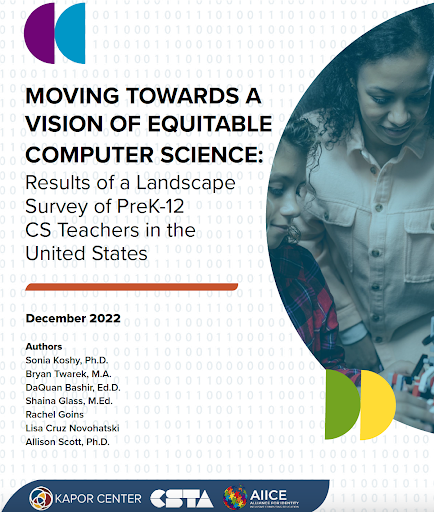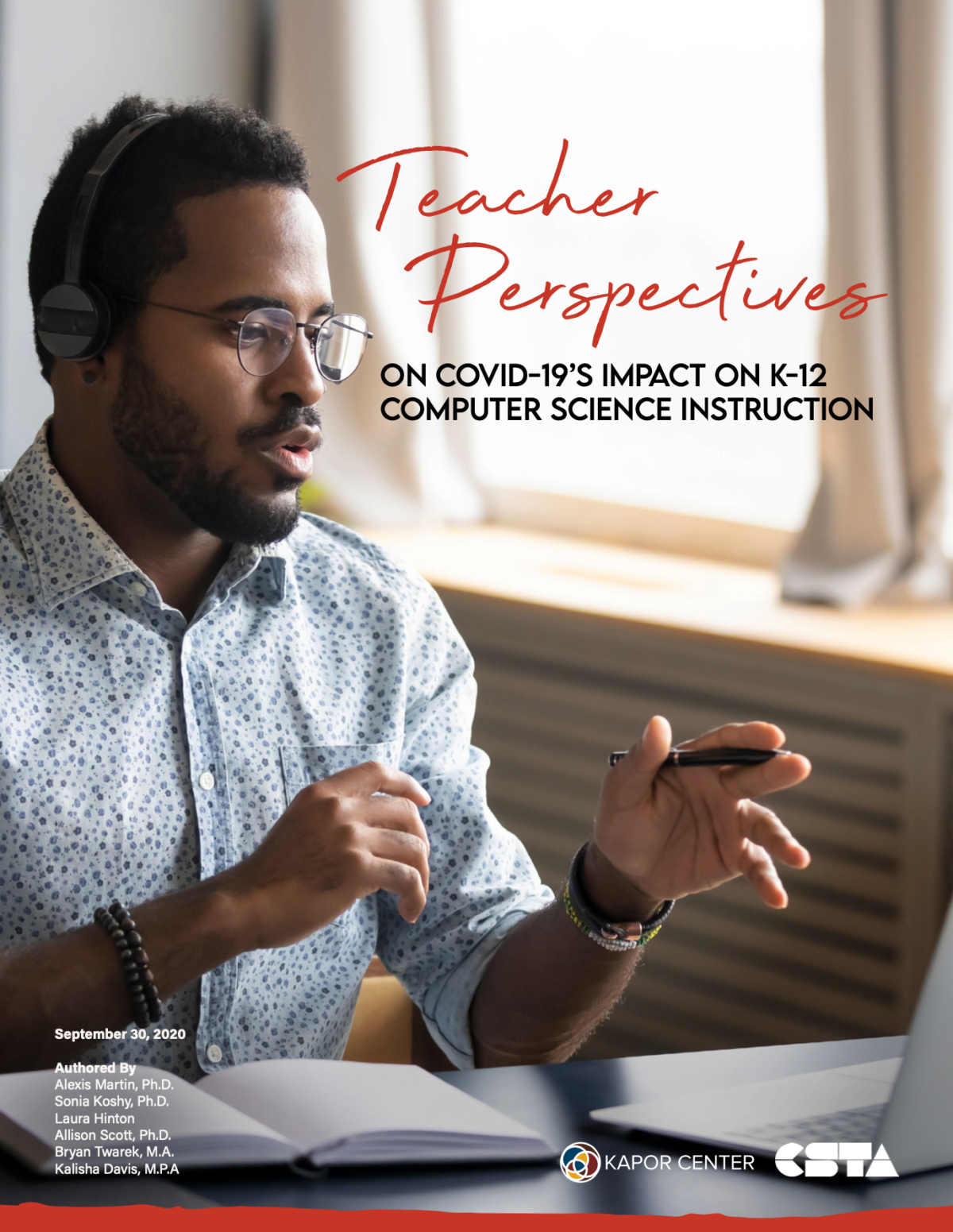NEW REPORT AVAILABLE!
In December 2022, CSTA, Kapor Center, and the Alliance for Identity Inclusive Computing Education (AiiCE) published a new landscape study of PreK-12 computer science teachers in the U.S. In this follow-up study, we sought a more nuanced understanding of teachers’ perceptions of how to move towards a vision of equitable CS. The report draws on a national sample of PreK-12 CS teachers to examine their views of both their professional development needs and institutional changes required to transform CS classrooms to be more identity-inclusive. Access the report and aligned resources at landscape.csteachers.org.

 While the technology sector remains one of the fastest growing industries across the nation and continues to rapidly permeate all facets of society, the next generation of the computing workforce must be equipped with the skills to examine how current systems exacerbate inequities and to develop new, more equitable innovations. To enable this shift, current computer science (CS) instruction will need to develop students’ computing identities, computational thinking, and ethical reasoning. Teachers are key to this transformation, yet little is known about PreK-12 CS teachers and how equipped they are to undertake this new set of responsibilities. In order to examine the backgrounds of CS teachers and the support and resources needed to implement culturally relevant computing pedagogical practices, the Kapor Center and the Computer Science Teachers Association surveyed nearly 3,700 PreK-12 CS teachers across all 50 states of the nation in summer 2020.
While the technology sector remains one of the fastest growing industries across the nation and continues to rapidly permeate all facets of society, the next generation of the computing workforce must be equipped with the skills to examine how current systems exacerbate inequities and to develop new, more equitable innovations. To enable this shift, current computer science (CS) instruction will need to develop students’ computing identities, computational thinking, and ethical reasoning. Teachers are key to this transformation, yet little is known about PreK-12 CS teachers and how equipped they are to undertake this new set of responsibilities. In order to examine the backgrounds of CS teachers and the support and resources needed to implement culturally relevant computing pedagogical practices, the Kapor Center and the Computer Science Teachers Association surveyed nearly 3,700 PreK-12 CS teachers across all 50 states of the nation in summer 2020.
Purpose
The purpose of the survey was to understand the current landscape of PreK-12 CS teachers, including their demographics, teaching background, school context, professional development, instructional practice, and knowledge of and use of culturally responsive teaching practices. Specifically, the report examines the following four questions:
- What are the demographic backgrounds of PreK-12 CS teachers and what credentials, preparation pathways, and experiences do they bring to CS classrooms?
- What challenges do PreK-12 CS teachers face in building equitable classrooms?
- To what extent are effective culturally-relevant CS teaching practices currently reflected in PreK-12 CS classrooms, and what are the challenges faced by teachers?
- What are the recommendations to support PreK-12 CS teachers in building equitable and inclusive classrooms?
The report concludes with a set of five recommendations for policymakers, educators, industry leaders, and school district administrators to support all computer science teachers in having the necessary equipment, curricula, and training needed to enact equity-centered pedagogies.
Teacher Demographics Dashboard
Below is an interactive dashboard showing the demographics of PreK-12 CS teachers. Click a state to see a summary of responses of PreK-12 CS teachers in that state. You can also click filter by grade band and school demographics (percent of student body who qualify for free/reduced price lunch and who identify as Black, Latinx, Indigenous, or Pacific Islander).
Click the (i) icon to learn more about the terminology and methodology. Note, this dashboard is best viewed on a desktop.
Updated June 1 to correct the number of teachers who selected at least one CS course
| Resources | Targeted Resources by Audience |
Teacher Perspectives on COVID-19’s Impact on K-12 CS Instruction
 We released our first report in October 2020 as a data brief that shares how COVID-19 and the rapid transition to virtual learning has impacted on PreK-12 CS education. The disruption caused by emergency distance learning poses a risk to equitable computer science education for students of color, low- income students, and rural communities.
We released our first report in October 2020 as a data brief that shares how COVID-19 and the rapid transition to virtual learning has impacted on PreK-12 CS education. The disruption caused by emergency distance learning poses a risk to equitable computer science education for students of color, low- income students, and rural communities.
The report details how existing disparities for marginalized communities worsened during this transition. It concludes with a set of four recommendations for policymakers, educators, industry leaders, and school districts to support high-quality computer science instructional efforts in the current crisis and to ensure we emerge as a more equitable nation.
Authors
Sonia Koshy, Ph.D.
Alexis Martin, Ph.D.
Laura Hinton
Allison Scott, Ph.D.
Bryan Twarek, M.A.
Kalisha Davis, M.P.A.
Acknowledgements
The authors would like to express gratitude for the expertise provided by a number of colleagues and collaborators, including: Jake Baskin, Frieda McAlear, Joanna Goode, Chris Stephenson, Jean Ryoo, Lijun Ni, Tom McKlin, Shana White, and Dinah Becton-Consuegra. We would additionally like to express appreciation to colleagues who assisted greatly with survey dissemination, including Cliff Worley, Paul Lim, Alicia Nunez, and Stacy Jeziorowski. We would also like to thank Nicole Vasgerdsian for report design. This project is generously supported by Code With Google and Google.org through the Equitable Computer Science Curriculum Initiative, and Mitch Kapor and Freada Kapor Klein.

